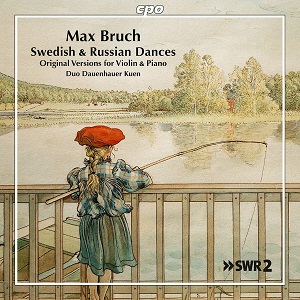
Max Bruch (1838-1920)
Songs and Dances after Russian and Swedish folk tunes, Op 79 (pub 1903)
Songs for voice and piano (arr. violin and piano)
Swedish Dances, Op 63 (1892)
Duo Dauenhauer Kuen
rec. 2021, SWR Studio Kaiserslautern, Germany
cpo 555 505-2 [63]
cpo has been a front-runner in the reclamation of some of Max Bruch’s more obscure music. The various iterations of the Swedish Dances Op 63, for example, which the pompous composer proudly proclaimed were the equal of anything by Brahms or Dvořák in their Hungarian and Slavonic sets, make repeated appearances in the series. Granted the appetite for this music was strong, and the market then buoyant, but Bruch wrote them originally for violin and piano and then refashioned them for piano, orchestra, piano two-hands and four-hands, and not forgetting a military band version. Christof Keymer has recorded the solo piano version, but you’ll find the Swedish and Russian Dances in their orchestral guise on cpo 777 385-2. Now here is the original version of the Swedish Dances for violin and piano, and the premiere recording, apparently (it always pays to be cautious in this game), of the Songs and Dances after Russian and Swedish folk tunes, Op 79.
Violinist Anna Sophie Dauenhauer and pianist Lukas Maria Kuen are Duo Dauenhauer Kuen and they’re communicative, warmly textured performers. There is stiff competition in the Op 63 Dances because Hyperion has recorded them with Dene Olding and Piers Lane, but the couplings are very different and the cpo duo emerge with credit, establishing the rather graphic swings between faster and slower Dances as Bruch alternates between lyric and fast dances with Teutonic regularity. Nevertheless, the duo finds the sensual lied, the songful flourish and the energising terpsichorean vitality at the heart of the set. Not to be played straight through, however.
The Op 79 set consists of nine dances, six Russian, three Swedish and are a mixture of simple and rather virtuosic. The longest is the fourth, a Russian Trauermarsch, sweetly intoned, and softly played, though elsewhere the bipartite example of the genre is represented too with a slow introduction followed by a fast dance. Some of the piano accompaniment in this set is almost orchestral in scope and Bruch’s alternation of robust and winsome is highly effective. The nature of the writing is such that I’m rather surprised this set hasn’t been recorded before and it’s to the performers’ great credit that they project the writing with such flavoursome brio.
The duo has arranged some of Bruch’s songs for violin and piano and this is another neglected area of his compositions. The songs lend themselves well to this gently transformative work, being largely yielding and essentially reserved. Once again, they’re played with deft lyricism and dextrous awareness of their fragility.
I have no complaints about the finely balanced recording in the SWR Studio in Kaiserslauten. This is a rather ingenious collection of dances though, as you might expect, I need to issue the standard critical suggestion that you listen selectively.
Jonathan Woolf
Help us financially by purchasing from




















